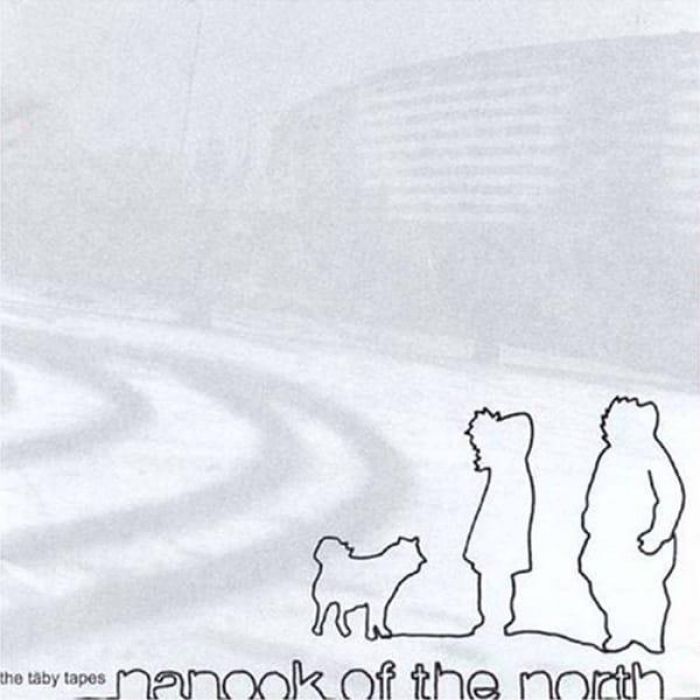The Täby Tapes by Nanook Of The North (Review)

In 1922, Robert Flaherty directed a documentary titled Nanook of the North, a “documentary” (all of the scenes were staged) that followed an Eskimo hunter named Nanook as he sought to provide for and sustain his family in the harsh Arctic climate. For many people who saw the film, it was their first glimpse of a lifestyle that had, for all intents and purposes, already disappeared. And the film still remains a landmark of documentary-style filmmaking to this day.
Flash forward to 21st century Stockholm and this story: While at a party, Mattias Olsson and Olle Söderström come across an Eskimo lad named Nanook who is playing songs written during his journey from Alaska. The three of them hole up in the studio with a bunch of instruments, and the result is The Täby Tapes. However, rather than being concerned with the same plights as the documentary that serves as his namesake, Nanook’s songs deal with far more “mundane” topics: love, friendship, alienation, and survival in a suburban, post-modern environment. (The album takes it name from a small Stockholm suburb where Nanook resides.)
Musically, it’s a bit too easy and tempting to compare The Täby Tapes to everyone’s favorite Scots, Belle and Sebastian. However, Nanook’s music is far less folk-y and incorporates larger arrangements and a number of vintage electronics including Rhodes piano, Magnus organ, mellotron, omnichord, and theremin. As a result, a more accurate comparison might be Bob Wratten’s Trembling Blue Stars. But again, that’s not wholly accurate. There’s enough of that quirky Nordic spirit percolating through these songs that they still feel plenty unique on their own. The results veer from dreamy pianos that could’ve been imported from Cocteau Twins’ Victorialand to omnichord solos, from the soft synths of “Nanook’s Ark” that settle down around the acoustic guitars like gently-falling snow to the ping pong-ing glitch guitars and sitar-like strings of “Where Will You Go?”
Listening to Nanook’s lyrics, it’s again tempting to dredge up the Belle and Sebastian comparisons. Nanook’s lyrics often have the same self-deprecating wit that characterizes Stuart Murdoch’s words. However, and I can think of no better way of putting it, Nanook’s lyrics just feel nicer. The wit is gentle and peaceful, rather than acerbic and pointed, even at it’s darkest. Sure, the lyrics can get pretentious at times, like when Nanook and Karin Engstrand — one of the many lovely Nordic chanteuses who join Nanook throughout the album — draw on the Israeli/Palestinian conflict as a metaphor for the urban decay of Nanook’s adopted hometown. Or something like that. However, other songs that seem too precious for their own good turn out to be quite affecting, such as “Karin Boye’s Grave.”
Here, Nanook et al. are gathered at a friend’s grave, talking to her ghost and urging her to rejoin the world of the living with lines like “You could have played in our band/We could have spread revolution through this land.” “Phonecall” (which possesses the same breathy swagger found on Eggman’s First Fruits) presumably chronicles a conversation between Nanook and a girl from his old village, as they argue over the pros and cons of living in Sweden. “St. George And The Dragon” uses the famous legend as a metaphor for the titanic struggle of a boy leaving a girl, raising the task to near-mythic proportions (“I may seem like a child/But I carry the mark of the righteous/I may seem like a joke to you/But I’m blessed with the sign of a warrior”).
Still other songs contain a certain biting insight that, when stripped of the lush, effortless musical arrangements and gorgeous vocals, prove quite disarming. “Hey Fragile” finds Nanook deriding a girl he sees in the club, not because she’s not good enough for him, but because she’s too good (“When I stumble you are the one I choose to shoot/‘Cause you are all that I could never be/All I despise and everything that I envy”). And throughout the album’s closer, the wonderfully-titled “Forget It Jenny, Love Is Just a Privilege for the Rich,” Nanook and Malin Olofsson go back and forth on love’s worth. Nanook takes the cynical side, proclaiming “Forget it Jenny, love is just a privilege for the rich you see/‘Cause love requires time and time is money,” with Malin (as Jenny) responding “No! Love is universal to humanity/It gets to you no matter of economy/Wherever there is life there’s opportunity.”
Some have raised doubts concerning the album’s veracity, if there’s really a Nanook and if he’s really an Eskimo lad from Alaska. And I have to admit, I have my own doubts, which does diminish some of the album’s charm. There’s something delightful about the thought of an Eskimo traveling halfway around the world, only to be discovered singing songs about love, friendship, and home in a Swedish bar. There’s something almost mythic about it, and Lord knows we could use more of that in pop music. However, remember the documentary film? There was nothing true about that, either, in the dictionary sense of the word. The entire film was staged, and the Eskimos starring in the film were quite modernized. Still, it was entirely truthful in the larger sense of the word, and eye-opening for those who saw it.
I suspect the same could be said of The Täby Tapes. Even if there really is no Nanook and no epic journey from Alaska to Sweden, the album’s world is so fully-formed and engaging that its songs are transformed into metaphors for bigger and brighter things that really are True. As a result, the struggles and desires sung about with such charm and effortlessness ring with honesty and emotion. And it certainly doesn’t hurt that it’s all wrapped up in a pop music package that’s so unique, quirky, and gorgeous.